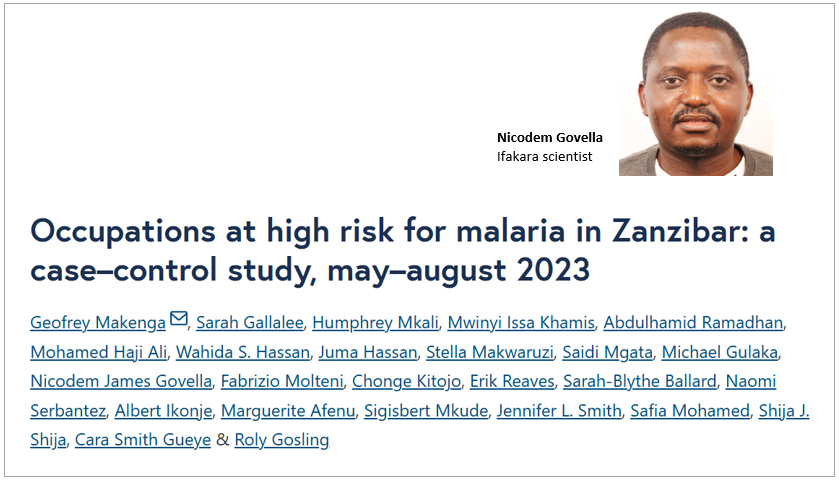
MALARIA: Study links high-risk jobs and night-time habits to rising cases in Zanzibar

A new study has revealed that certain jobs and night-time behaviors are putting some people at higher risk of contracting malaria in Zanzibar, even as the islands move closer to eliminating the disease.
The research, published in Malaria Journal and co-authored by Ifakara Health Institute scientist Dr. Nicodem Govella, calls for targeted interventions to protect high-risk groups and curb local malaria transmission.
Dr. Govella worked alongside other experts from Population Services International, the University of California San Francisco, Zanzibar Malaria Elimination Programme (ZAMEP), Swiss Tropical Public Health and U.S. partners.
Who is most at risk?
The study found that in Zanzibar’s urban districts, certain occupations like night watchmen, police officers, construction workers, and farmers face much higher risks. Night watchmen and police officers were found to be over five times more likely to contract malaria compared to others, while construction workers faced three times the risk. Farmers also showed increased vulnerability.
In rural districts, no occupation stood out, but behaviors such as spending nights outdoors or eating meals outside significantly increased malaria risk.
Lifestyle factors play a role
Beyond occupations, the study highlighted everyday habits that drive malaria transmission. People engaging in night-time outdoor activities or eating outdoors were two to four times more likely to get malaria.
Meanwhile, bed nets remained protective—especially in rural areas—highlighting their continued importance in malaria prevention.
What this means for Zanzibar’s elimination goal
The study, conducted between May and August 2023, involved 197 malaria patients and 557 controls across four districts. Only cases without recent travel outside Zanzibar were included, ensuring the focus remained on locally acquired infections.
Researchers concluded that Zanzibar’s elimination efforts should now focus on more targeted interventions—particularly those that protect people from mosquito bites outside the home. Promising options may include spatial repellents, insecticide-treated clothing, or vector control measures around high-risk worksites.
“Tailored interventions targeting specific occupational groups could be an effective strategy to reduce malaria in urban areas in Zanzibar,” the authors noted.
Read publication here.
